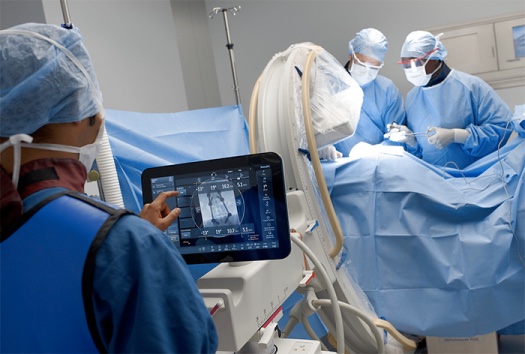 Amsterdam-based Royal Philips recently announced that any hospital or healthcare facility with one of the company’s computed tomography (CT) models will now be eligible to become a lung cancer screening center. Philips’ CT solutions suite has just been granted 510(k) clearance from the U.S. Food and Drug Administration for low-dose lung cancer screening (LCS).
Amsterdam-based Royal Philips recently announced that any hospital or healthcare facility with one of the company’s computed tomography (CT) models will now be eligible to become a lung cancer screening center. Philips’ CT solutions suite has just been granted 510(k) clearance from the U.S. Food and Drug Administration for low-dose lung cancer screening (LCS).
The suite, with its 27 CT and PET/CT models, plus integrated software and services, together provide what Philips claims is the most comprehensive lung cancer screening solution in the field.
Lung cancer is the leading cause of cancer death among both men and women in the U.S., and the source of one in four cancer deaths. Lung cancer screenings are recommended by the Center for Medicare & Medicaid Services (CMS) to help earlier diagnosis of the disease in high-risk populations at a stage where treatment can be more successful.
Early detection using this method has been shown to not only improve the accuracy of prognosis, effectiveness, and treatment, but also to decrease death rates by up to 20 percent. In addition, if diagnosed in stage 1, patients can have up to a 49 percent chance of survival compared to diagnoses at stage 3, where survival rates are as low as 5 percent.
“Lung cancer is the number-one cancer killer in America, taking more American lives than colon, breast, and prostate cancer combined, and early detection is key to fighting this terrible disease,” said Brady J. McKee, a radiologist at Lahey Hospital and Medical Center, in a press release. The Lahey Hospital & Medical Center is a physician-led, nonprofit practice in Massachusetts with more than 500 physicians and 5,000 nurses, therapists, and other support staff, and a pioneer in the early lung cancer detection, featuring the largest clinical lung cancer screening program in the country.
 The Lahey Hospital & Medical Center in Burlington, Massachusetts, encompasses an ambulatory care center serving more than 3,000 patients a day and a 317-bed hospital. Lahey Medical Center in Peabody serves more than 800 outpatients each day and includes a 10-bed hospital.
The Lahey Hospital & Medical Center in Burlington, Massachusetts, encompasses an ambulatory care center serving more than 3,000 patients a day and a 317-bed hospital. Lahey Medical Center in Peabody serves more than 800 outpatients each day and includes a 10-bed hospital.
“The work Philips has done to improve a provider’s screening capability not only benefits individual patients,” McKee said, “but hospitals at each step of their lung cancer screening program implementation and execution, which is often a very complicated process that includes community outreach, physician education, patient and data management, and reporting.”
Philips’ low-dose CT solutions can now give the ability to build robust lung cancer screening programs to healthcare organizations with varying clinical and economic resources and needs — from community hospitals to multi-facility health systems. Through its integrated radiology solutions and services, Philips can help healthcare executives to better assess availability of existing scanners, and work with them to establish an enterprise-wide lung cancer program designed to deliver advanced patient care and access.
“Our robust portfolio of CT solutions offers our customers in the United States a turnkey approach to lung cancer screening,” said Rob Cascella, CEO of Diagnostic Imaging at Philips. “This is a complementary offering to utilize existing systems to bring low-dose CT screening to healthcare facilities of all sizes who want to drive earlier detection for patients at high risk for lung cancer.”
According to the press release, Philips lung cancer screening solutions provide benefits for patients and referring physicians, including:
- Personalized management of radiation dose, using one of the most accelerated screening approaches in the industry, with 27 models of Philips CT and PET/CT solutions qualified to perform CT lung cancer screening and utilize active dose management tools.
- Greater insights throughout the process: Referring physicians are better able to manage the process from every angle with software that enables access to patient data, offering insight into scheduling, results, and follow-up activities.
- Advanced image data sharing and analytics: Through its IntelliSpace Portal, Philips offers one of the most comprehensive solutions for detection, diagnostics, and therapy follow-up. To address increasing interest in pulmonary care, the latest version, IntelliSpace Portal 8.0, includes the new CT Lung Nodule Assessment application designed for more efficient workflow to provide additional clinical support.
Cascella explains in a blog entry: “Radiology, along with almost every aspect of healthcare, has been forced to adapt and evolve as hospital systems focus on becoming more efficient in the face of value-based care. Everyone from patients, payers, and regulators are exerting pressure on hospitals to cut costs and provide more cost-effective care,” he wrote. “With advanced digital technology in place, radiology will break free from its reputation as a cost-center and be a key component of cost reduction strategies. But that doesn’t mean that the quality of service will diminish. In fact, the same changes that can lead to lower costs can also result in better care for both practitioners and patients.”
Philips says its commitment to innovative radiology solutions includes improving services and continuing to engage with radiology customers, along with delivery of integrated software, solutions, and services that help their specific needs. The company also provides radiology practices with critical insights that can help them transform care — for example, enabling them to be more efficient and effective.


